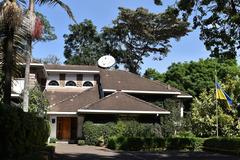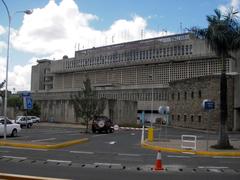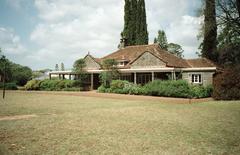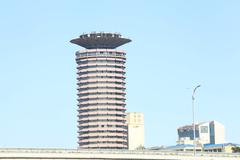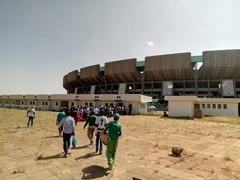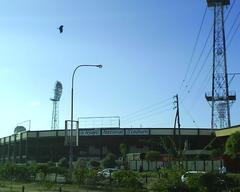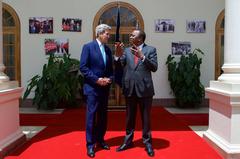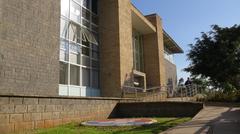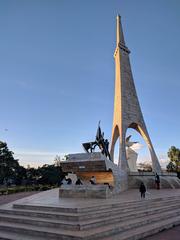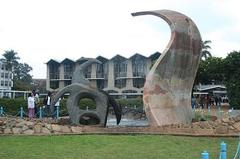RFUEA Ground Nairobi: Visiting Hours, Tickets, and Tourist Guide
Date: 04/07/2025
Introduction
The Rugby Football Union of East Africa (RFUEA) Ground, located along Nairobi’s bustling Ngong Road, stands as a testament to Kenya’s enduring rugby legacy. Since its establishment in the mid-20th century, this stadium has grown from a focal point for regional rugby into a vibrant community and cultural hub, anchoring Nairobi’s sporting identity and drawing fans from across East Africa. The RFUEA Ground has hosted historic events—including the legendary 1955 inaugural match between the East Africa team and the touring British Lions—and continues to nurture local talent through its support of major tournaments like the Safari Sevens and the Elgon Cup (standardmedia.co.ke, everything.explained.today, wikipedia.org).
This guide explores the RFUEA Ground’s storied history, practical visitor information, accessibility features, upcoming expansion projects, and its role in Nairobi’s social and cultural landscape. Whether you are a seasoned rugby enthusiast, a history lover, or a curious traveler, this guide will help you make the most of your visit to one of Nairobi’s iconic sporting venues. For up-to-date schedules and details, consult the Kenya Rugby Union official website and the Audiala app.
Table of Contents
- Historical Overview
- Visitor Information: Hours, Tickets, and Access
- Events and Community Impact
- Architectural Features and Planned Upgrades
- Travel Tips and Nearby Attractions
- Frequently Asked Questions (FAQ)
- References
Historical Overview
Origins and Establishment
Rugby was introduced to British East Africa by colonial settlers in the early 20th century. The Rugby Football Union of Kenya (RFU-K) was formed in 1921 to oversee the sport across Kenya, Uganda, and Tanganyika. As the game’s popularity grew, the Rugby Football Union of East Africa (RFUEA) was established in 1953 to unify regional rugby and provide a permanent home—culminating in the construction of the RFUEA Ground (everything.explained.today, wikipedia.org).
The stadium’s inaugural match took place on September 28, 1955, when the East Africa team played the visiting British Lions in front of 6,000 spectators—a defining moment that marked the beginning of the venue’s enduring rugby legacy (standardmedia.co.ke).
Sporting Significance
The RFUEA Ground has served as the home for historic rugby events, including the Enterprise Cup (one of Africa’s oldest rugby tournaments), the Elgon Cup (annual Kenya-Uganda rivalry), and the internationally acclaimed Safari Sevens (pulsesports.co.ke). The ground is also the base of the Kenya Harlequin Football Club and the Kenya Rugby Union, cementing its status as the heart of Kenyan rugby (wikipedia.org).
Visitor Information: Hours, Tickets, and Access
Visiting Hours
- Match and Event Days: Gates open 1–2 hours before scheduled matches and close after the event.
- Non-Event Days: The ground is primarily an administrative site for the Kenya Rugby Union. Tours may be arranged in advance; always confirm via the Kenya Rugby Union website.
Ticketing
- Purchase: Tickets are available online through official platforms and at the stadium on match days. Early purchase is advised for major events.
- Prices: General admission typically ranges from KSh. 300–1,500 (US$3–15), with higher prices for VIP or international fixtures.
- Entry: Carry a valid ID. Expect security checks at the entrance.
Accessibility
- Mobility: Wheelchair ramps and designated seating are available. Facilities are gradually being upgraded to improve accessibility.
- Parking: Limited on-site parking is available. Use ride-hailing services or public transport during major events to avoid congestion.
- Transport: Easily reached by taxi, ride-hailing apps (Uber, Bolt), and matatus serving Ngong Road.
Events and Community Impact
Major Events
- Kenya Cup Matches: Elite domestic rugby union games
- Safari Sevens: Annual international rugby sevens tournament
- Elgon Cup: Kenya vs. Uganda rugby rivalry
- Community Festivals and Youth Tournaments: Supporting grassroots and youth development
Community Engagement
The stadium plays a pivotal role in nurturing local talent, with programs aimed at youth and women’s rugby, and hosts community festivals that foster social cohesion and celebrate Nairobi’s multicultural vibrancy (livinglovingkenya.com).
Architectural Features and Planned Upgrades
Stadium Layout and Facilities
- Capacity: Approximately 6,000 spectators, with plans to expand to 20,000.
- Facilities: Main stand, open terraces, changing rooms, concession stalls, administrative offices.
- Recent Upgrades: Terrace expansion (supported by the Safaricom Foundation), borehole installation for pitch maintenance.
Expansion Plans
- New Seating: Additional covered stands and improved sightlines are planned.
- Accessibility: Enhanced ramps, restrooms, and facilities for persons with disabilities.
- Sustainability: Incorporation of solar power, rainwater harvesting, and eco-friendly materials.
- Timeline: Major upgrades are expected between 2025 and 2030, including the acquisition of adjacent grounds for further expansion.
Travel Tips and Nearby Attractions
Essential Tips
- Best Time to Visit: Peak rugby season (February–November). Arrive early for popular matches.
- Weather: Nairobi is mild year-round; July is cool (16–22°C). Bring a light jacket.
- Safety: Use reputable transport, secure valuables, and stay within well-trafficked areas (travellersworldwide.com).
Nearby Attractions
- Yaya Centre: Shopping and dining complex nearby
- Nairobi Arboretum: Urban botanical garden
- Kenyatta International Conference Centre: City views from the rooftop (weltreize.com)
- Nairobi National Park: Wildlife reserve a short drive away
- Uhuru Park: Historic green space (kendiritasafaris.co.ke)
Accommodation
From budget guesthouses in Kilimani to mid-range hotels in Upper Hill, options are plentiful. Book early during peak rugby and tourism seasons (globalhighlights.com).
Frequently Asked Questions (FAQ)
What are the RFUEA Ground’s visiting hours?
The ground is open on match and event days, with gates opening 1–2 hours before kickoff. For non-event visits, check with the Kenya Rugby Union.
How do I buy tickets?
Purchase tickets online via official platforms or at the stadium gate. Early booking is recommended for popular matches.
Is parking available?
On-site parking is limited; use public transport or ride-hailing options during major events.
Is the ground wheelchair accessible?
Yes; accessibility features are available and are being improved as part of ongoing upgrades.
Are guided tours offered?
Occasional tours may be arranged. Contact the Kenya Rugby Union for availability.
Can I bring outside food and drinks?
Small snacks and water are generally allowed; check event-specific policies.
References
- Kenya Rugby Union Official Website
- Pitch of Kenya’s Rugby History – Standard Media
- RFUEA Ground – Everything Explained
- Rugby Football Union of East Africa – Wikipedia
- Kenya Rugby Union – Wikipedia
- Elgon Cup History – Pulse Sports
- RFUEA Ground Visitor Guide – Roads & Kingdoms
- Is Nairobi Worth Visiting? – Hey Explorer
- Is Kenya Safe to Visit? – Travellers Worldwide
- Kenyatta International Conference Centre Tips – Weltreize
- Nairobi Weather in July – Global Highlights
- Uhuru Park Historical Significance – Kendirita Safaris
- Nairobi Gallery and Historical Buildings – Twende Sasa
- Kenya Sports Heritage – Living Loving Kenya
Plan Your Visit
Experience the thrill of Kenyan rugby and immerse yourself in Nairobi’s sporting culture at the RFUEA Ground. For the latest fixtures, tickets, and updates, visit the Kenya Rugby Union official website and download the Audiala app for live notifications and exclusive guides.
The RFUEA Ground is more than a stadium—it’s a living symbol of Nairobi’s unity, history, and vibrant community spirit. Don’t miss the chance to witness its legacy firsthand!
